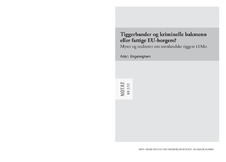| dc.contributor.author | Engebrigtsen, Ada | |
| dc.date.accessioned | 2020-06-07T21:05:57Z | |
| dc.date.accessioned | 2021-04-29T13:59:37Z | |
| dc.date.available | 2020-06-07T21:05:57Z | |
| dc.date.available | 2021-04-29T13:59:37Z | |
| dc.date.issued | 2012 | |
| dc.identifier.isbn | 978-82-7894-420-2 | |
| dc.identifier.issn | 1890-6435 | |
| dc.identifier.uri | https://hdl.handle.net/20.500.12199/3401 | |
| dc.description.abstract | This report is about the new migration of beggars, street-musicians and other street-workers in Norway, and other European countries and beyond. The report is based on conversations with beggars in Oslo and on secondary data on beggars in Edinburgh and Glasgow by Cerasela Voiculescu, on interviews with NGO’s involved in beggar-issues and on observations of street-activities. Interviews with migrants and officials in Romania are also part of the basis for this report. The majority of these new migrants are Romanian citizens, mostly from the Rom minority. The report has to objectives: 1) To give an empirical presentation of the new migration of beggars from Romania; who they are, where they come from, how they are organized and about the society they live in. 2) The second objective is to analyze and discuss the Norwegian beggar-discourse and the ambiguity surrounding the encounter between poor beggar-migrants and the Norwegian welfare-society. The report starts out with a brief historical overview of begging as an economic niche and follows up with a broader introduction to the history of the Rom-minority in Romania. Then the empirical data from the study are presented, and the first section is summed up with some comparative examples from other European countries and a discussion about poverty, shame and dignity. The second section is mostly about the Norwegian welfare-state and the media discussions concerning foreign beggars and begging in Norway. The encounters between the Norwegian public and the Romanian beggars are discussed in terms of Zygmunt Bauman’s reflections about the poor in consumer-societies. The report is summed up by a discussion based on Nancy Frazer’s analysis of social justice in a situation where injustice and poverty have transnational implications, while legal and social rights are based on national laws. | en |
| dc.description.abstract | Dette notatet handler om den nye migrasjonen av tiggere og andre gatearbeidere i Norge. Notatet bygger i sin helhet på samtaler med tiggere først og fremst i Oslo over en femårsperiode, med instanser som arbeider med tiggere, på feltbesøk i Romania og på litteratur, reportasjer og leserinnlegg om rumenske tiggere bl.a. i pressen. Forfatterens langvarige forskning om rom i Romania og i Norge er basis for studien. Notatet diskuterer tigging i Europa og Norge i historisk perspektiv og gir en presentasjon av rombefolkningens historie og vilkår i Romania. Videre presenteres sentrale sider ved tiggernes virksomhet i Norge; hvordan de kommer hit, hva de gjør her, hvordan de organiserer seg og lignende. De vanligste forestillingene om utenlandske tiggere presenteres og diskuteres med basis i europeisk forskning og data som er fremkommet gjennom denne studien. Sist diskuterer forfatteren tiggernes plass i velferdsstaten og etterlyser en diskusjon om fattigdomsbekjempelse i Europa på tvers av nasjonalstaten. | no_NB |
| dc.publisher | Oslo Metropolitan University - OsloMet: NOVA | |
| dc.relation.ispartofseries | NOVA Notat 2/12 | |
| dc.subject | NOVA | |
| dc.title | Tiggerbander og kriminelle bakmenn eller fattige EU-borgere? | no_NB |
| dc.type | Notat | |
| fagarkivet.author.link | https://www.oslomet.no/om/ansatt/adae | |
| fagarkivet.source.pagenumber | 62 | |
